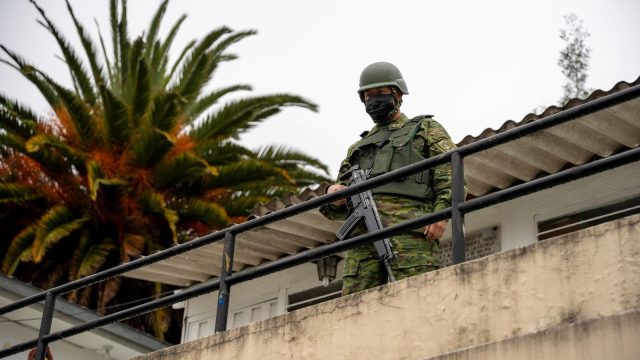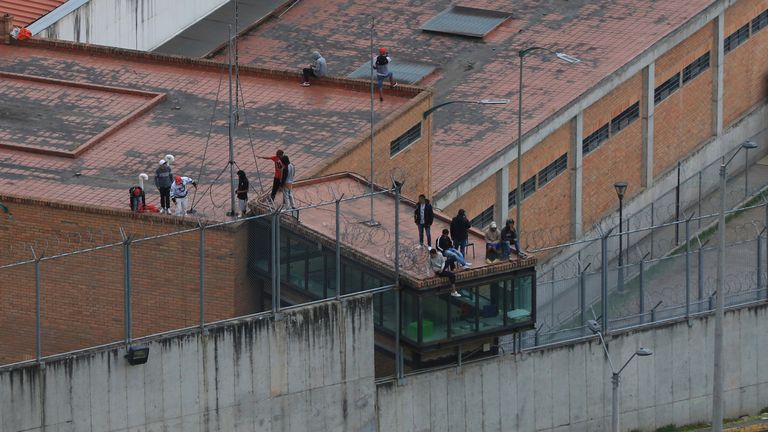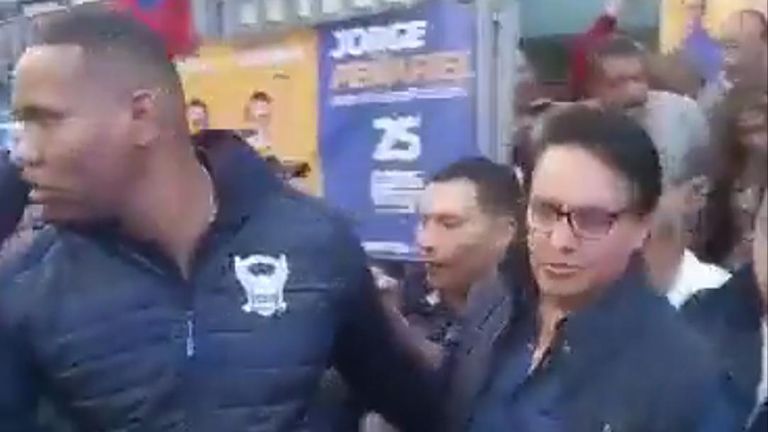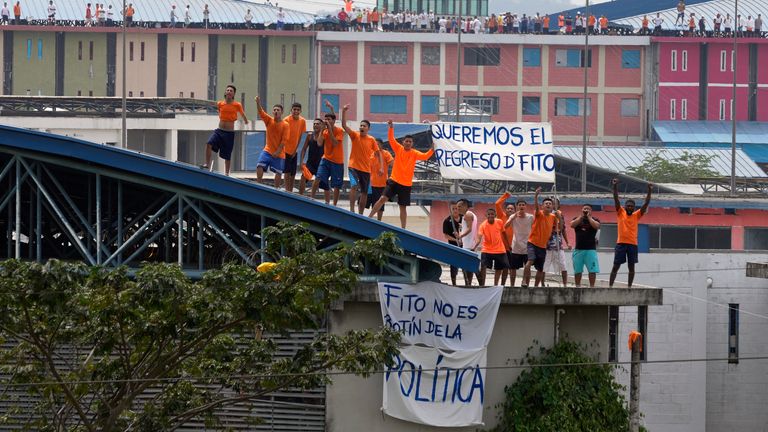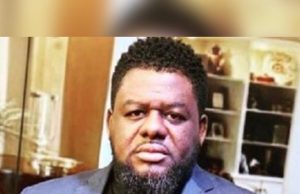A mass hostage taking in Ecuador’s gang-ruled prisons and the assassination of a politician are the latest bloody episodes in a country gripped by the cocaine trade.
The South American nation has descended into violence in recent years, with the government shown to be weak in the face of increasingly brutal drug cartels.
Earlier this week inmates in six different prisons took dozens of guards and police hostage for more than a day, while outside the walls explosions went off across the country.
The 50 guards and seven officers were eventually let go and were reported to be safe – but the circumstances under which they were released are unclear.
The government believes members of criminal gangs inside the prisons carried out the violence in response to efforts to take back control of several jails – relocating inmates and seizing weapons.
Authorities have also pointed to a power vacuum created by the killing of a druglord known as Rasquina three years ago as pouring fuel on the fire, but experts say the problem goes back much further…
‘A wave of retaliation that ended up claiming his life’
Security analyst Daniel Ponton believes this week’s violence is intended to generate fear among the population – and influence politics.
He said the attacks were “systematic and clearly planned” and showed the state was ineffective at preventing violence.
Ecuador is set to elect a new president in a run-off vote next month, but one of the prominent candidates was assassinated before the first round.
Fernando Villavicencio had made clear he was willing to challenge organised crime – and had a plan to do it.
The former journalist had proposed militarising Ecuador’s ports and taking back control of the prisons, Will Freeman, a political scientist at the Council on Foreign Relations thinktank, told Sky News.
“In a sense his proposals set off a wave of retaliation that ended up claiming his life,” Mr Freeman said.
Mr Villavicencio had accused the Los Choneros cartel and its imprisoned leader, Adolfo Macias, of threatening him and his campaign team days before the assassination.
Competition over drug routes through Ecuador
Ecuador is a “drug trafficker’s paradise” sandwiched between the world’s two largest producers of coca (the plant from which cocaine is derived), Mr Freeman says.
Amounts of cocaine seized in the country – which notably do not include the amount that evades authorities – have skyrocketed in recent years.
The national currency is dollars which makes it ideal for cartels wanting to launder money, he added.
“Narcotrafficking didn’t begin yesterday in Ecuador,” he said. “It’s being going on since the ’90s, 2000s.”
But he says it used to be under the control of the Revolutionary Armed Forces of Colombia (FARC), who had a monopoly.
But when FARC laid down their weapons as part of a peace agreement in 2016, things changed.
Since then, control over the drug routes across the Ecuador-Colombia border has been a competition among several groups, Dr Annette Idler, an associate professor of global security at the University of Oxford, told Sky News.
Mexican drug cartels, present in Ecuador since the 1990s, have also taken advantage of the situation, she said.
She added: “Another factor is domestic groups that are the ones we’ve seen involved in the prison violence, they’ve become more professionalised.
“There’s a lot of competition over drug trafficking routes that go from Colombia via Ecuador to the US and that then has led to those unprecedented levels of violence in the country.”
Death of a drug lord
Ecuadorian authorities have suggested that some of the recent violence stems from the power vacuum created by the assassination of Jorge Luis Zambrano, the leader of Los Choneros.
Asked if this was the case, both Mr Freeman and Dr Idler said it played a role but was part of a much bigger picture.
Zambrano, known by his nickname Rasquina, led the cartel as it took over much of the drug trade left by the demobilisation of FARC.
Mr Freeman said: “When he was taken out there began to be more intense fighting between Los Choneros and their rivals, and also within Los Choneros among mid-level commanders for control of the organisation – fighting which continues to this day.”
“That explains some of the violence”, Dr Idler told Sky News. But she added: “It’s just a smaller piece of a much larger picture, which is much more about the geopolitical landscape and the security landscape that is about the cocaine.
“So it’s much more about understanding how those different types of illicit flows, the cocaine flows, the weapons that are being trafficked… how they are shaping the ways in which different types of groups try to have control over the territory.”
Asked what the solution is to the crisis, Dr Idler says the problem cannot be solved by Ecuador alone.
Instead, she says, it needs to be a regional approach with investment in development, sustainability and building capacity across multiple countries.

